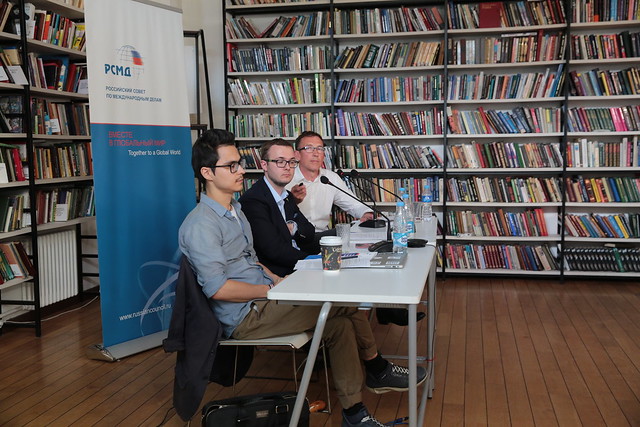On July 18, 2017, RIAC held a debate titled “Fake News and World Politics”. The lecturers were Lawrence McDonnell, former BBC corresponded in Moscow, and Pavel Koshkin, Deputy Editor of RBC’s international department and former Editor-in-Chief of the analytical resource Russia Direct in English language. RIAC’s Media and Government Relations Manager Nikolai Markotkin moderated their discussion.
On July 18, 2017, RIAC held a debate titled “Fake News and World Politics”. The lecturers were Lawrence McDonnell, former BBC corresponded in Moscow, and Pavel Koshkin, Deputy Editor of RBC’s international department and former Editor-in-Chief of the analytical resource Russia Direct in English language. RIAC’s Media and Government Relations Manager Nikolai Markotkin moderated their discussion.
The American presidential elections were one of the most talked about political events of 2016 and were marked by extremely aggressive manipulation in the media. It was during the primary elections race that the term "fake news" firmly established itself in the vocabularies of both the employees of informational and analytical agencies and their readers. The concept, which initially pertained only to the fabricated news, gradually expanded to include the fake polls and prejudiced expert analysis, and became an instrument of open manipulation of the public opinion. However, "fake news" itself is not the problem, but merely a symptom of the onset of the “post-truth” era, in which opinions and expert comments have almost more influence than the actual news.
Given the rapid spread of "fake news" and their popularity among readers, are we seeing a sharp decline in the importance and influence of traditional media? Is it possible that the rise of "fake news" in social networks was one of the decisive factors that determined the outcome of the presidential elections in the US? Did the phenomenon of "fake news" have a negative impact on the Russia-US relations? What kinds of challenges for journalists and politicians poses the growing popularity of Facebook and other social networks as the main news resources? What measures can be taken to counter aggressive manipulation on the Internet?
Lawrence McDonnell noted that we have entered the era in which opinions are more important than facts, i.e. the era of "post-truth". Nowadays, the election consultants use the social networks to increase the popularity of their candidates. The content they distribute is the most effective method of influencing the voters, and is cheaper in comparison to other media.
Despite their destructive influence, according to the former BBC correspondent McDonnell, "fake news" do not change the political reality. Politicians still need to interact with correspondents in person. Amongst the main strategies to fight against this negative phenomenon, the expert singled out a thorough check of facts and active collaboration with social media.
Pavel Koshkin noted that the phenomenon of "fake news" is not new. In fact, the targeted use of false information served as an integral part of the military strategy even in ancient history. The expert argued that the “fake news” in the modern world stem from a range of factors, including: the political confrontations, growing public distrust in experts, the tendency of masses to construct conspiracy theories, the rise of the entertainment component of the media, the development of digital technologies, information noise and the emergence of journalism based on leaks.
Pavel Koshkin added that in order to prevent the false news, it is necessary to clearly distinguish between the facts and opinions, increase media literacy and develop a culture of discussion. He also concluded that journalist exchange programs can help alleviate this problem.
Second part of the event was dedicated to the discussion, when people from the audience had the opportunity to ask both speakers various questions regarding “fake news” and “post-truth”.
Фото

Video (In Russian)




